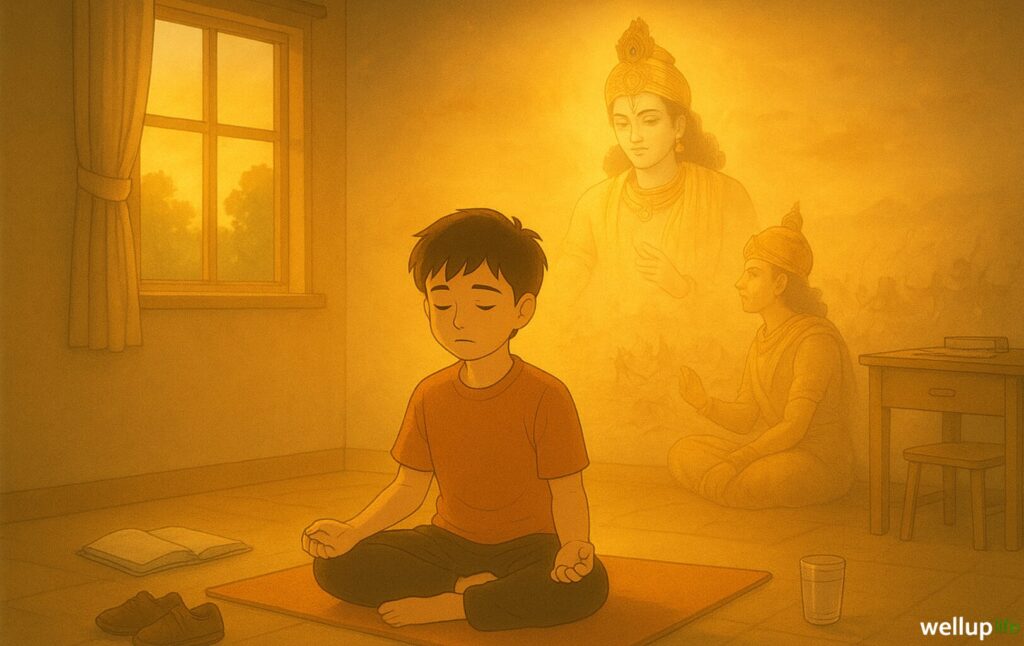Physical Address
304 North Cardinal St.
Dorchester Center, MA 02124
We independently evaluate and recommend products we believe will benefit our readers. If you purchase through links on this page, we may earn a commission.
Written By:

Published On: August 17, 2025
Last Updated On: October 6, 2025
Reviewed By:


In today’s fast-paced world, stress, anxiety, and constant distractions have become part of everyday life. From work pressure to social media overload, many people are searching for ways to find lasting inner peace. Interestingly, the answers to modern mental challenges can often be found in a 5,000-year-old Hindu scripture. The Bhagavad Gita, a 700-verse dialogue between Lord Krishna and Arjuna, offers profound guidance on how to achieve clarity, calm, and balance amidst life’s chaos [1]Bhagavad Gita Overview – Encyclopaedia Britannica.
Unlike many spiritual texts that are read as religious scriptures, the Gita is also a practical manual for the mind. Its teachings on detachment, self-discipline, equanimity, and mindfulness are directly relevant to our modern struggles with stress and overthinking [2]How the Bhagavad Gita Supports Mental Health – RKT Blog. For example, the Gita reminds us that the mind can be either our best friend or our worst enemy, depending on whether we master it or let it control us [3]Bhagavad Gita 6.5–6 Verse Commentary – Times of India.
This article explores 5 key Bhagavad Gita lessons for mental peace in the modern era, showing how ancient principles like mindfulness, detachment, and meditation can reduce stress and restore balance. Along the way, we’ll highlight some of the most powerful Gita quotes for mental calm and Bhagavad Gita mind control quotes that you can apply in daily life.
We live in an age of extraordinary progress—smartphones, instant communication, endless entertainment, and comforts our ancestors couldn’t imagine. Yet, at the same time, more people than ever report feeling stressed, anxious, and mentally exhausted. The paradox is clear: our external life is easier, but our inner life feels heavier.
So why is mental peace slipping away despite modern advancements?
Every second, our minds are bombarded with information—social media updates, endless news cycles, online comparisons, and constant notifications. Instead of clarity, this creates confusion and noise. We overanalyze situations, replay conversations in our heads, and worry about the future. The result? A restless mind that can’t sit still, even in silence.
Much of our mental unrest comes from tying happiness to outcomes. We believe peace will arrive after a certain promotion, relationship, or purchase. But when reality doesn’t match our expectations, disappointment takes over. The cycle continues—always chasing, never arriving. This attachment to results creates inner turbulence, making peace feel temporary and fragile.
Peace requires stability, and stability comes from discipline. But modern life encourages extremes—binge-watching late into the night, irregular meals, skipping rest, or chasing quick pleasures. Over time, these habits weaken both body and mind. Without routine and moderation, the mind becomes scattered, unable to focus or stay calm.
Many of us unknowingly depend on the approval of others to feel good about ourselves. Social media amplifies this—likes, comments, and followers become silent judges of self-worth. The danger is clear: when our peace depends on external validation, it becomes fragile. A single negative remark or lack of attention can shatter it.
No matter what we achieve, it never feels enough. There’s always someone richer, smarter, or more successful to compare with. The modern culture of “more” pushes us into constant dissatisfaction—more money, more recognition, more comfort. The mind, always chasing the next thing, never rests.
One of the biggest reasons for mental unrest is not knowing why we are doing what we do. Many people achieve success but still feel empty inside because their actions are disconnected from a deeper meaning. Without purpose, even victories feel hollow, and setbacks feel unbearable.
If the modern mind feels restless due to overthinking, unending desires, lack of inner discipline, and dependence on external validation, then the remedy must go beyond surface-level stress relief. Quick fixes like entertainment, travel, or temporary distractions may soothe us briefly, but they rarely bring lasting calm. True peace requires a shift in how we perceive life, manage emotions, and connect with our inner selves.
This is where the timeless wisdom of the Bhagavad Gita lessons for mental peace, spoken over 5,000 years ago, becomes profoundly relevant. Though born in a different age, the Gita addresses the same struggles of anxiety, doubt, attachment, and inner conflict that we face today. Its insights cut across time and culture, offering guidance not only for spiritual seekers but also for anyone looking to handle daily challenges with clarity and strength.
The Bhagavad Gita does not suggest running away from responsibilities or suppressing emotions. Instead, it teaches us how to remain calm in the midst of chaos, how to control the wandering mind, and how to find stability through discipline and self-awareness. It emphasizes inner mastery over external circumstances—reminding us that peace is not found outside, but cultivated within.
In essence, the Gita serves as both a manual for mental resilience and a path to inner balance, showing us how to live with detachment, focus, and purpose. These qualities are exactly what the modern individual needs to overcome stress, reduce restlessness, and experience lasting inner harmony.
Having seen how the Bhagavad Gita offers a path to inner calm, the next step is to look at the lessons it shares for everyday life. True mental peace is not just the absence of stress, but the presence of clarity, balance, and inner strength.
The Bhagavad Gita lessons for mental peace are timeless reminders that guide us in controlling the mind, detaching from unnecessary worries, and living with higher awareness. Now let’s explore 5 of these powerful Gita teachings that can help us navigate life with inner peace and strength.
The Bhagavad Gita emphasizes that the real battle in life is not always external—it begins in the mind itself. Lord Krishna tells Arjuna that the mind can be both our greatest ally and our toughest enemy, depending on how we train it. In Chapter 6, Verse 6, the Gita states:
“For one who has conquered the mind, the mind is the best friend. But for one who has failed to do so, the mind will remain the greatest enemy.”
(Bhagavad Gita 6.6) [4]Bhagavad Gita 6.6 – Verse Meaning
This is one of the most powerful Bhagavad Gita mind control quotes, reminding us that mental peace starts with mastering our thoughts. In today’s world, where constant notifications, social comparison, and information overload create mental unrest, this teaching is more relevant than ever.
Modern psychology also supports this idea—practices like cognitive reframing and mindfulness meditation show that we can train the mind to respond calmly instead of reacting impulsively [5]Mind Training and Mental Health – APA.
In short, the Gita teaches us that before we fight battles at work, in relationships, or in society, we must first win the battle within our thoughts. By mastering this inner battlefield, we lay the foundation for true mental peace.
One of the central lessons of the Bhagavad Gita is the art of detachment. Lord Krishna explains to Arjuna that true peace comes not from clinging to results, but from focusing on one’s duty with balance. In Chapter 2, Verse 48, he says:
“Perform your duty equipoised, O Arjuna, abandoning all attachment to success or failure. Such equanimity is called yoga.”
(Bhagavad Gita 2.48) [6]Bhagavad Gita 2.48 – Verse Explanation
This is one of the most quoted teachings on equanimity in the Gita, and it provides a timeless strategy for mental calm. When we are too attached to outcomes—whether it’s exam results, career growth, or relationships—our minds become restless. Success brings overexcitement, while failure leads to disappointment.
Psychologists today highlight that reducing outcome attachment lowers anxiety and improves well-being. This aligns beautifully with the Gita’s wisdom, where detachment and equanimity are seen as keys to inner freedom [7]Detachment & Well-being – Positive Psychology.
In practice, cultivating equanimity helps us maintain mental peace no matter what life throws at us. Instead of being tossed around by success and failure, we learn to stand balanced, calm, and focused.
The Bhagavad Gita repeatedly reminds us that faith (śraddhā) and self-awareness are powerful sources of mental strength. In Chapter 4, Verse 39, Lord Krishna explains:
“A faithful person who is absorbed in transcendental knowledge and who subdues the senses quickly attains supreme peace.”
(Bhagavad Gita 4.39) [8]Bhagavad Gita 4.39 – Verse Explanation
This verse highlights two important lessons:
In modern life, uncertainty is one of the biggest causes of anxiety—uncertainty about career, relationships, or health. Faith doesn’t mean blind belief; rather, it’s the inner conviction that with effort and patience, things will align. This mindset gives resilience during hard times.
For example:
The Gita also emphasizes self-awareness—understanding that we are not just the body or the restless mind, but the eternal self. In Chapter 2, Verse 13, Krishna says the soul moves through different stages of life while remaining unchanged [9]Bhagavad Gita 2.13 – Eternal Self. This perspective reduces fear, worry, and attachment.
In psychology, cultivating self-awareness is seen as a foundation of emotional intelligence and stress management [10]Self-Awareness and Emotional Well-being – APA. Just as the Gita advises, knowing ourselves deeply helps us respond with calm instead of reacting with panic.
By combining faith and awareness, the Gita teaches us to unlock inner strength. With this strength, we face challenges with courage, rather than fear, and move closer to true mental peace.
The Bhagavad Gita teaches that the mind is naturally restless, often wandering toward distractions, fears, or desires. However, it also gives us a solution—redirecting the mind to higher, uplifting thoughts. In Chapter 6, Verse 26, Krishna says:
“From wherever the mind wanders, due to its flickering and unsteady nature, one must certainly withdraw it and bring it back under the control of the self.”
(Bhagavad Gita 6.26) [11]Bhagavad Gita 6.26 – Verse Meaning
This is one of the most practical Bhagavad Gita mind control quotes. It acknowledges that distraction is natural, but teaches us the art of gently bringing the mind back to focus—whether on duty, meditation, or inner peace.
This aligns beautifully with the Gita’s wisdom: just as the mind can be trained through discipline, modern psychology shows that the brain can be reshaped through consistent focus.
Try this simple 3-step exercise inspired by the Gita:
This daily practice not only enhances concentration but also creates lasting mental calm. Over time, the restless mind becomes a trained ally instead of a constant enemy.
The Bhagavad Gita highlights meditation (Dhyāna Yoga) and daily discipline as essential tools for calming the restless mind. In Chapter 6, Verse 15, Krishna explains:
“Thus, constantly disciplining himself, the yogi, controlled in mind, attains peace, the supreme bliss, that abides in Me.”
(Bhagavad Gita 6.15) [13]Bhagavad Gita 6.15 – Verse Meaning
Here, meditation is not seen as an escape, but as a daily practice to center the mind and live with balance. Along with meditation, discipline in daily habits ensures that peace becomes a way of life, not just a temporary experience.
The Gita’s approach is similar—calm the wandering mind, focus inward, and reconnect with your higher self.
Krishna also emphasizes regularity and moderation (BG 6.16–17), teaching that peace comes to those who live with balance in eating, sleeping, working, and resting. This balance is as important as meditation itself.
Practical Examples:
Through meditation in the Bhagavad Gita and daily discipline, we learn that peace is not something to chase—it is cultivated within us through steady practice. Over time, the mind becomes quieter, life feels more balanced, and inner calm becomes natural.
While these five teachings give us practical tools to cultivate inner peace, the Bhagavad Gita’s wisdom truly comes alive through its timeless verses. Let’s now look at some of the most powerful quotes for mental calm and mind control that directly reflect these lessons.
The Bhagavad Gita emphasizes that the mind can be both our greatest friend and our worst enemy. These timeless verses serve as reminders to cultivate discipline, detachment, and inner awareness—qualities that naturally bring peace and strength in a restless world.
The mind is restless, turbulent, obstinate, and very strong, O Krishna, and to subdue it is more difficult than controlling the wind.
 — Bhagavad Gita 6.34
— Bhagavad Gita 6.34This verse highlights how powerful the mind is, yet shows us that through practice and detachment, control is possible.
For one who has conquered the mind, the mind is the best friend. But for one who has failed to do so, the mind will remain the greatest enemy.”






It reminds us that peace comes when we master the mind, while chaos comes when we let it master us.
Perform your duty with equanimity, abandoning attachment to success or failure. Such equanimity is called yoga.






A practical teaching that detachment from outcomes reduces stress and anxiety, leading to lasting calm.
There is no possibility of one’s becoming a yogi if one eats too much or eats too little, sleeps too much or does not sleep enough.






Balance in daily habits is essential for keeping the mind clear and focused.
The mind is controlled by constant practice and detachment, O Arjuna.






A reminder that consistency in spiritual and mental discipline is the path to true inner calm.
These Bhagavad Gita quotes for mental calm and mind control beautifully reinforce the five teachings we explored above. They remind us that the path to lasting peace begins within — through self-mastery, awareness, and balance.
If you feel inspired to explore the teachings more deeply, owning a copy of the Bhagavad Gita can be life-changing. Today, you can easily buy the Bhagavad Gita online in different formats—whether you want a simple translation for beginners or a detailed commentary with Sanskrit verses.
You can find these editions on Amazon, Flipkart, or local bookstores. If you’re a beginner, choose a translation that’s simple to follow. For deeper study, a commentary edition will give you insights into each verse.
By keeping a copy of the Gita close, you’ll always have a timeless guide for mental peace, clarity, and purpose.


⭐ 4.8/5 · 7,000+ Ratings
Category: Spiritual Wisdom, Philosophy, Mindfulness, Self-Improvement
Description: A widely respected edition of the Bhagavad Gita with Sanskrit verses, English translation, and commentary—guiding readers toward peace and self-realization.
Buy On AmazonThe wisdom of the Bhagavad Gita is not bound by time or culture—it speaks directly to the human mind. From mastering our thoughts, practicing equanimity, and strengthening faith, to rewiring the mind with higher focus and cultivating daily meditation, the Gita offers a practical roadmap for inner calm.
Modern psychology and neuroscience continue to confirm what the Gita taught thousands of years ago: the quality of our thoughts shapes the quality of our lives. By reflecting on Gita quotes for mental calm and applying Bhagavad Gita mind control quotes in daily practice, we can transform stress into clarity, anxiety into balance, and restlessness into peace.
Ultimately, the Gita reminds us that mental peace is not found outside—it is cultivated within through awareness, discipline, and a higher perspective. Even in the busiest modern life, just a few minutes of reflection on its verses can restore balance and remind us of our deeper strength.
Start today: pick one verse, one practice, or one principle from the Gita and live it for a week. You’ll notice how timeless wisdom creates modern peace.
Vedant & Stoic Thinker
Suchit Prajapati, MA in Philosophy, is the Editorial Director at Wellup Life. A passionate Vedant and Stoic thinker, he inspires readers to embrace happiness, inner peace, and purposeful living through timeless wisdom.


Reviewed By:



Reviewed By:



Reviewed By:



Reviewed By:



Reviewed By:

Wellup Life is your space for personal growth, wellness, and mindful living. From self-improvement and productivity to spirituality and relationships, we share practical insights and timeless wisdom to help you live with clarity, balance, and purpose.
Copyright © 2024 – Wellup Life — All rights reserved
